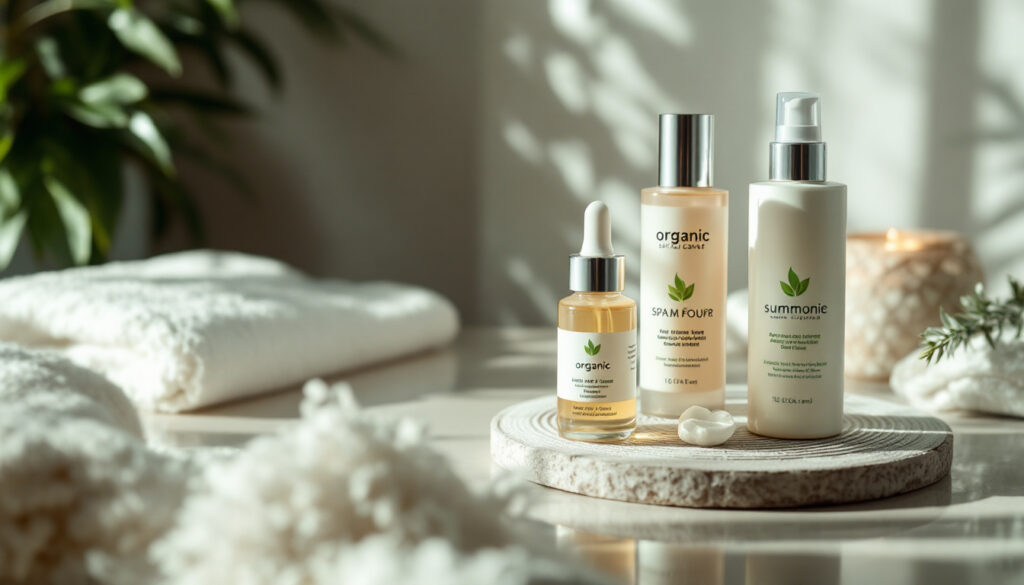Table of Contents
Have you noticed the buzz around organic skincare lately? It’s not just a passing trend—these organic beauty products are capturing attention for good reason. As more people become mindful of what they apply to their skin, the demand for natural, cleaner options is growing. But the big question is: are these products truly better than conventional ones?
Picture this: you’re chatting with a friend over coffee, and skincare comes up. You’ve both admired the glowing complexions of those who swear by organic products, and you’re curious. What makes organic skincare so appealing, and is it worth the switch?
In this article, we’ll explore the benefits of organic skincare products and help you understand if they’re the right choice for you.
Understanding Organic Skincare
When we talk about natural and organic skincare, we’re referring to products made with ingredients that are grown without synthetic fertilizers, pesticides, or genetically modified organisms. But what truly sets organic skincare products apart from their conventional counterparts?
Defining Organic Skincare
Organic skincare products are crafted using natural ingredients that meet specific standards for purity and sustainability. These standards are often certified by organizations like USDA Organic or COSMOS, which ensure that the ingredients are sourced responsibly and processed minimally. This means you’re getting a product that prioritizes both your health and the environment.
Standards and Certifications
- USDA Organic: For a product to earn this certification, it must contain at least 95% organic ingredients. It’s a stringent standard that assures you of the purity and quality of the product.
- COSMOS: This certification involves a thorough evaluation of the entire production process, from ingredient sourcing to packaging.
Importance of Ingredient Sourcing
One of the key aspects of organic skincare brands is their commitment to ethical ingredient sourcing. This involves:
- Sustainability: Ingredients are harvested in ways that do not deplete natural resources or harm ecosystems.
- Fair Trade: Many brands ensure fair wages and working conditions for farmers and workers involved in the supply chain.
Formulation Matters
Organic skincare products often have simpler formulations, free from synthetic fragrances, dyes, and preservatives. This can be beneficial for people with sensitive skin, as these products are less likely to cause irritation or allergic reactions.
Why Choose Organic?
- Safety and Health: Using products free from harmful chemicals can reduce your exposure to toxins.
- Environmental Impact: Supporting organic skincare brands contributes to more sustainable agricultural practices.
The Benefits of Organic Skincare
Switching to organic skincare products can be a game-changer for both your skin and the planet. Let’s dive into the benefits associated with these products, addressing everything from skin health to environmental impact and ingredient safety.
Skin Health
One of the key benefits of organic skincare products is their impact on skin health. These products are free from harsh chemicals, synthetic fragrances, and preservatives that can irritate the skin. Instead, they use gentle, natural ingredients that nourish and support your skin’s natural barrier.
- Nourishment: Organic products are rich in vitamins, antioxidants, and essential oils that promote healthy, glowing skin.
- Less Irritation: Wondering, is organic skincare suitable for sensitive skin? Absolutely! The absence of harsh chemicals makes it a great choice for those with sensitive or allergy-prone skin.

Environmental Impact
Choosing organic skincare is not just about personal health; it’s also an environmentally conscious decision.
- Sustainable Practices: Organic farming avoids synthetic pesticides and fertilizers, reducing pollution and soil degradation.
- Biodiversity: By supporting organic agriculture, you’re helping to preserve natural ecosystems and promote biodiversity.
Safety of Ingredients
Organic skincare products prioritize ingredient safety, minimizing your exposure to potentially harmful substances.
- Transparency: These products often have clear labeling and certifications, so you know exactly what you’re applying to your skin.
- Fewer Contaminants: Organic standards limit the use of toxic substances, ensuring cleaner and safer formulations.
Common Misconceptions
There are some misconceptions about organic skincare that deserve clarification:
- Price: While some organic products may be pricier, many affordable options exist. Consider it an investment in your health and the environment.
- Effectiveness: Some people doubt the effectiveness of organic skincare. However, these products can be just as effective, if not more so, due to their high-quality natural ingredients.
How Does Organic Skincare Compare to Natural Skincare?
You might wonder, how does organic skincare compare to natural skincare? While both aim to use natural ingredients, organic products go a step further by ensuring these ingredients are grown without harmful chemicals and meet strict certification standards.
- Certification: Organic skincare is certified, whereas natural skincare may not be.
- Purity: Organic products guarantee a higher level of purity and environmental responsibility.
Switching to organic skincare can offer numerous benefits for your skin and the planet. By understanding these advantages, you can make informed choices that align with your values, ensuring that your skincare routine is both effective and sustainable.
If you’re considering making the switch, it’s helpful to learn about the steps involved in transitioning to a natural skincare routine.
Popular Organic Skincare Brands
In 2024, the market is brimming with exceptional organic skincare brands, each offering unique products that cater to various needs and budgets. Here are some of the top organic skincare brands for 2024 that stand out for their quality and commitment to sustainability.
1. Tata Harper
Known for its luxurious formulations, Tata Harper offers some of the best organic skincare products that are 100% natural and non-toxic. The brand prides itself on using farm-fresh ingredients and advanced green technology. Its commitment to transparency and sustainability makes it a favorite among eco-conscious consumers.
2. Dr. Hauschka
A pioneer in holistic skincare, Dr. Hauschka combines natural ingredients with rigorous scientific research. This brand is renowned for its biodynamic farming practices and rhythmic processing methods that enhance the potency of its products. Their soothing treatments are ideal for sensitive skin.
3. Herbivore Botanicals
Herbivore Botanicals is celebrated for its minimalistic yet effective formulations. With a focus on natural ingredients and eco-friendly packaging, this brand offers affordable organic skincare options without compromising on quality. Their products are cruelty-free and vegan, appealing to a wide audience.
4. Juice Beauty
Juice Beauty is a standout for its innovative use of organic botanical juices as a base for its skincare line. This brand is committed to sustainability, using solar-powered manufacturing and recyclable packaging. Their products are clinically validated, offering results-driven solutions.
5. Weleda
Weleda has been a trusted name in organic skincare for decades. Known for its ethical sourcing and holistic approach, Weleda’s products are crafted with biodynamic ingredients. Their Skin Food line, in particular, is a cult favorite for its deeply nourishing properties.

What Sets These Brands Apart?
- Ingredient Integrity: These brands prioritize high-quality, organic ingredients that are sustainably sourced.
- Certifications: Many of these companies hold certifications like USDA Organic, ensuring transparency and trust.
- Commitment to Sustainability: Innovative packaging solutions and eco-friendly practices are a hallmark of these brands.
- Affordability: While some luxury brands exist, there are plenty of affordable options that don’t sacrifice quality.
Each of these brands brings something unique to the table, making it easier for consumers to find products that meet their specific skincare needs while aligning with their values. Whether you’re seeking luxury or affordability, the options are vast and promising in 2024.
Creating an Effective Organic Skincare Routine
Building an organic skincare routine tailored to your skin type and concerns can transform your skincare journey. Whether you have sensitive skin, acne, or other issues, here’s a step-by-step guide to help you create a routine that works for you.
Step 1: Cleansing
Start with a gentle cleanser to remove impurities without stripping your skin of its natural oils.
- For Sensitive Skin: Use a fragrance-free, calming cleanser with ingredients like chamomile or aloe vera.
- For Acne-Prone Skin: Opt for a cleanser with tea tree oil or willow bark to help control breakouts.
Step 2: Toning
Toners help balance your skin’s pH and prepare it for the next steps.
- For Sensitive Skin: Choose alcohol-free toners with soothing ingredients like rose water.
- For Acne-Prone Skin: Look for a toner containing witch hazel or green tea for anti-inflammatory benefits.
Step 3: Exfoliating
Exfoliation removes dead skin cells, helping to clear pores and improve texture. Do this 1-2 times a week.
- For Sensitive Skin: Use a gentle enzyme exfoliant with papaya extract.
- For Acne-Prone Skin: Consider a light exfoliant with salicylic acid to help unclog pores.
Step 4: Serum
Serums target specific concerns with concentrated ingredients.
- For Sensitive Skin: A hydrating serum with hyaluronic acid can provide moisture without irritation.
- For Acne-Prone Skin: Use a serum with niacinamide to reduce inflammation and control oil production.
Step 5: Moisturizing
Moisturizers lock in hydration and protect your skin barrier.
- For Sensitive Skin: Opt for a lightweight moisturizer with calendula or oat extract.
- For Acne-Prone Skin: Choose a non-comedogenic moisturizer with aloe vera or jojoba oil.
Step 6: Sun Protection
Sunscreen is essential to protect your skin from UV damage.
- For All Skin Types: Use a broad-spectrum SPF formulated with zinc oxide for gentle protection.
Additional Tips
- Patch Test: Always test new products on a small area to ensure compatibility.
- Consistency: Stick with your routine for several weeks to see results.
- Adjust Seasonally: Modify your routine as needed based on climate changes.
Night Routine
At night, consider adding:
- For Sensitive Skin: A nourishing face oil with evening primrose.
- For Acne-Prone Skin: A spot treatment with sulfur or clay to target active breakouts.
Creating an organic skincare routine that suits your skin type can lead to healthier, more radiant skin. Remember, the key is to choose products with natural ingredients that address your specific concerns, whether it’s an organic skincare routine for acne or organic skincare for sensitive skin. With patience and the right products, you’ll achieve the glowing skin you desire.
DIY Organic Skincare Recipes
Creating your own skincare products at home is a fun and rewarding way to enjoy natural and organic skincare products. Here are some simple DIY organic skincare recipes that you can try.
1. Honey and Oatmeal Face Mask
Ingredients:
- 1 tablespoon organic honey
- 2 tablespoons finely ground oatmeal
Instructions:
- Mix honey and oatmeal in a small bowl.
- Apply the mixture to your face, avoiding the eye area.
- Leave on for 15-20 minutes, then rinse with warm water.
Benefits: Honey is a natural humectant, keeping your skin hydrated, while oatmeal gently exfoliates and soothes irritation.
2. Coconut Oil Lip Balm
Ingredients:
- 2 tablespoons organic coconut oil
- 1 tablespoon beeswax pellets
- 1 teaspoon shea butter
Instructions:
- Melt the coconut oil, beeswax, and shea butter in a double boiler.
- Pour the mixture into a small container and let it cool.
Benefits: This balm moisturizes and protects your lips with nourishing ingredients.
3. Green Tea Toner
Ingredients:
- 1 cup brewed green tea (cooled)
- 1 tablespoon apple cider vinegar
Instructions:
- Combine the green tea and apple cider vinegar in a spray bottle.
- Use as a toner after cleansing your face.
Benefits: Green tea is rich in antioxidants, while apple cider vinegar helps balance your skin’s pH.
Benefits of DIY Skincare
- Customization: Tailor recipes to your specific skin needs and preferences.
- Cost-Effective: Save money by using simple, natural ingredients.
- Control: Know exactly what goes into your products, avoiding harmful chemicals.
With these easy recipes, you can enjoy the benefits of personalized skincare solutions right at home.
Evaluating Effectiveness: Does It Work?
The effectiveness of organic skincare products compared to conventional ones is a topic of much debate. Let’s explore scientific studies, anecdotal evidence, and expert opinions to see how these products stack up.
Scientific Studies
Research on organic skincare is still emerging, but some studies suggest benefits:
- Acne Treatment: Ingredients like tea tree oil and aloe vera found in organic products have shown promise in reducing acne. So, can organic skincare help with acne? Yes, certain products can be effective.
- Antioxidant Properties: Organic ingredients often contain high levels of antioxidants, which help protect skin from environmental damage.
Expert Opinions
Dermatologists generally agree that the effectiveness of skincare products depends on the ingredients rather than whether they are labeled organic. However, they note that organic products can be gentler on the skin due to the absence of synthetic chemicals.
- Look for These Ingredients: Experts recommend seeking organic products with proven ingredients like hyaluronic acid for hydration, chamomile for soothing, and green tea for its anti-inflammatory properties.
Anecdotal Evidence
Many users report positive experiences with organic skincare, often highlighting improvements in skin texture and reduced irritation. Testimonials frequently mention the benefits of switching to organic products, especially for sensitive skin types.
DIY Organic Skincare
Are DIY organic skincare recipes effective? While DIY solutions can be beneficial for some, it’s important to consider:
- Ingredient Quality: Using fresh, high-quality ingredients is crucial for effectiveness.
- Skin Sensitivity: Always perform patch tests to ensure compatibility.
While more extensive research is needed, existing studies and user experiences suggest that organic skincare can be effective, particularly for those with sensitive skin or specific concerns like acne. By focusing on high-quality ingredients and understanding your skin’s needs, you can make informed choices about incorporating organic products into your routine.
Cost vs. Value in Organic Skincare
When considering organic skincare products, many wonder if the benefits justify the often higher price tag compared to conventional options. Let’s explore the price range and evaluate the value these products offer.
Price Range
- Organic Skincare: These products generally cost more due to high-quality, sustainably sourced ingredients and certification processes. Expect to pay premium prices for brands that are certified and use pure, natural components.
- Conventional Skincare: Often more affordable, but may contain synthetic chemicals and fillers that can be harsh on the skin.
Evaluating the Benefits
Quality Ingredients
Organic skincare products are crafted with ingredients that are free from harmful chemicals, making them particularly suitable for sensitive skin. This makes them some of the best organic skincare for sensitive skin.
Environmental Impact
Organic brands often prioritize eco-friendly practices, which adds value for environmentally conscious consumers. Supporting these brands contributes to sustainable agriculture and reduced pollution.
Skin Health
Using products with fewer irritants and more natural ingredients can lead to healthier skin. The long-term benefits of reduced exposure to harmful chemicals may outweigh the initial cost.
Affordable Options
While some organic products are pricey, there are affordable organic skincare brands that offer effective solutions without breaking the bank. Look for brands that prioritize ingredient quality over marketing hype.
Although organic skincare can be more expensive, the benefits of using clean, environmentally friendly products may justify the cost for many consumers. By investing in high-quality skincare, you support both your skin’s health and the planet. Ultimately, the decision depends on personal values and skincare goals.
Is Organic Skincare Really Worth It?
In exploring the benefits of organic skincare products, we’ve highlighted their ability to nourish the skin with natural ingredients, their reduced environmental impact, and their suitability for sensitive skin. Organic skincare often involves a higher price tag due to sustainable practices and high-quality ingredients. However, many find these factors justify the investment, especially when considering long-term skin health.
The choice ultimately depends on individual preferences and skin needs. If you prioritize clean ingredients and sustainability, organic skincare can be a valuable addition to your routine. For those on a budget, affordable options are available that still provide the benefits of organic formulations.
Is organic skincare really worth it? For many, the answer is yes, as it aligns with their values and skincare goals. By understanding your skin’s unique needs, you can make informed decisions about incorporating organic products into your regimen.
FAQ: Organic Skincare
Welcome to our FAQ section, where we address common questions about organic skincare. Whether you’re new to this approach or looking to refine your routine, you’ll find helpful insights here.
What are the best organic skincare brands?
Some top organic skincare brands include Tata Harper, Dr. Hauschka, and Weleda. These brands are known for their high-quality, sustainable products.
How do I create an organic skincare routine?
Start with a gentle cleanser, followed by a toner, serum, moisturizer, and sunscreen. Tailor your routine to your skin type and concerns, such as using calming products for sensitive skin or acne-fighting ingredients for breakouts.
What ingredients should I look for in organic skincare products?
Look for ingredients like aloe vera, chamomile, tea tree oil, and hyaluronic acid. These are known for their soothing, hydrating, and acne-fighting properties.
Can organic skincare help with acne?
Yes, organic skincare can help with acne. Ingredients like tea tree oil and willow bark can reduce inflammation and clear pores.
What are the benefits of using organic skincare products?
Benefits include reduced exposure to harmful chemicals, improved skin health, and a positive environmental impact due to sustainable practices.
Is organic skincare suitable for sensitive skin?
Absolutely. Organic skincare often contains fewer irritants and is formulated with gentle, natural ingredients, making it ideal for sensitive skin.
How does organic skincare compare to natural skincare?
While both use natural ingredients, organic skincare ensures these are grown without synthetic chemicals. Organic products often come with certifications that guarantee purity and sustainability.
What are some affordable organic skincare options?
Brands like Herbivore Botanicals and Juice Beauty offer affordable organic skincare without compromising on quality.
What is the best organic skincare for aging skin?
Look for products containing antioxidants like vitamin C, as well as hydrating ingredients like hyaluronic acid to address signs of aging.
Are DIY organic skincare recipes effective?
DIY recipes can be effective if you use high-quality, fresh ingredients. Always perform a patch test to ensure compatibility with your skin.








